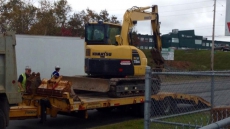SASKATOON — The federal government has announced more than $35 million in research infrastructure funding for 37 Canadian universities where scientists are pushing the boundaries of knowledge in areas such as breast cancer prevention, intelligent drone technology and better pet food.
Ed Holder, minister of science and technology, says the funding came through the Canada Foundation for Innovation’s John R. Evans Leaders Fund.
That's a fund designed to help universities attract and retain the best and brightest researchers from around the world by equipping them with cutting-edge research infrastructure.
The announcement was made at the University of Saskatchewan, where Dr. Lynn Weber leads a team of veterinary biomedical specialists who examine the cardiovascular health of household pets.
Using Saskatchewan-grown peas, beans and lentils, the research could present a new opportunity within the global pet food market for Saskatchewan pulse growers who were responsible for $3 billion in Canadian exports last year.
In addition to the funding for Weber’s lab, the University of Saskatchewan also received funding for infrastructure supporting research in biofuels, cancer and freshwater monitoring and rehabilitation.
“We are making record investments necessary to push the boundaries of knowledge, create jobs and prosperity and improve the quality of life of Canadians," said Holder. "Canada has become a destination of choice for highly talented scientific researchers thanks in part to our support for world class university and college infrastructure which helps train the next generation of Canadian research talent.”
Weber said the money will allow her facility to install new ultrasound equipment "that will give us the play-by-play of cellular activity in dogs and cats. How these cells respond to a diet partially made of pulses will help us develop nutritious pet food options to ensure the health and vitality of pets.”




